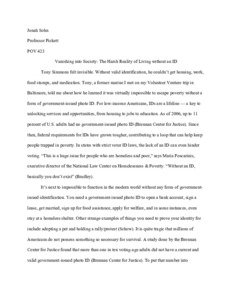| dc.rights.license | In Copyright | en_US |
| dc.creator | Sohn, Jonah | |
| dc.date.accessioned | 2023-04-25T14:51:37Z | |
| dc.date.available | 2023-04-25T14:51:37Z | |
| dc.date.created | 2023 | |
| dc.identifier | WLURG038_Sohn_POV_2023 | |
| dc.identifier.uri | https://dspace.wlu.edu/handle/11021/36211 | |
| dc.description | Capstone; [FULL-TEXT FREELY AVAILABLE ONLINE] | en_US |
| dc.description | Jonah Sohn is a member of the Class of 2023 of Washington and Lee University. | en_US |
| dc.description.abstract | There are millions of Americans like Tony Simmons that become trapped in poverty as they struggle to function in society without an ID. Not having an ID makes it exponentially harder for one to find employment or access social services, two things that could help low income people escape the cycle of poverty. It also acts as a barrier for one to vote and participate in the democratic process. This problem is not uncommon as across the country more than one in ten Americans do not have government issued photo identification cards. Unfortunately, those most likely to be affected by this inequality are historically marginalized and low-income groups. The harm caused by these race and class inequalities appear to be unjust once looking at the significant burdens faced by those without an ID and comparing them to the burdens of other
parties involved. Through this lens, it becomes difficult to object to the current social structures that make it exceptionally difficult for these groups to get an ID. These clear inequalities now become inequities or unjust inequalities, and I believe we must therefore do everything we can to remove barriers that these groups encounter when seeking state-issued identification. Everyone should easily be able to get a photo ID if they want to. A photo ID is more than just a piece of plastic. It can play an important role in restoring the dignity of the oppressed. In the words of Brent Downs, a formerly homeless man who now serves on the board of directors of the Phoenix-based Homeless ID Project, "[when] you're experiencing homelessness, you get used to being invisible. And now you don't even have a piece of ID that says who you are" (Wiltz). [From concluding section] | en_US |
| dc.language.iso | en_US | en_US |
| dc.rights | This material is made available for use in research, teaching, and private study, pursuant to U.S. Copyright law. The user assumes full responsibility for any use of the materials, including but not limited to, infringement of copyright and publication rights of reproduced materials. Any materials used should be fully credited with the source. | en_US |
| dc.rights.uri | http://rightsstatements.org/vocab/InC/1.0/ | en_US |
| dc.subject.other | Washington and Lee University, Shepherd Poverty Program | en_US |
| dc.title | Vanishing into Society: The Harsh Reality of Living without an ID | en_US |
| dc.type | Text | en_US |
| dcterms.isPartOf | RG38 - Student Papers | |
| dc.rights.holder | Sohn, Jonah | |
| dc.subject.fast | Identification numbers, Personal -- Government policy | en_US |
| dc.subject.fast | Capabilities approach (Social sciences) | en_US |
| local.department | Shepherd Poverty Program | en_US |
| local.scholarshiptype | Capstone | en_US |
